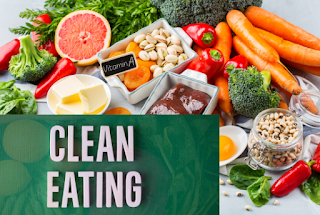Embracing Clean Eating: A Balanced Perspective on the Pros and Cons
In the realm of fitness and health, the concept of clean eating has gained significant attention, and for good reason. Let's embark on a flavorful journey through the myriad of advantages and challenges that come with this lifestyle choice.
Pros of Clean Eating:
A Recipe for Good Health
1. Wholesome Well-being: Clean eating isn’t just about losing weight; it’s about nurturing your body with wholesome, unprocessed foods that provide essential nutrients for overall well-being.
2. Culinary Adventure: By cooking for yourself, you dive into the world of flavors, experimenting with fresh ingredients and discovering the joy
3. Calorie Conscious of creating nutritious meals from scratch.
Clean eating makes it easier to track your calorie and macronutrient intake, aiding those striving for specific fitness goals.
4. Sustainable Energy: Fueling your body with nutrient-dense foods ensures sustained energy levels throughout the day, keeping you active and vibrant.
5. Mindful Eating: Clean eating promotes mindfulness about what you consume, fostering a healthy relationship with food and preventing mindless binging.
6. Enhanced Mental Clarity: A balanced diet free from processed foods can lead to improved focus, concentration, and mental well-being.
7. Environmental Impact: Opting for organic and sustainable choices supports eco-friendly farming practices, reducing the carbon footprint.
Cons of Clean Eating: The Spice of Life
1. Individual Definition: The term ‘clean eating’ lacks a standardized definition, leading to varied interpretations and confusion among enthusiasts.
2. Limited Variety: Clean eating might limit your food choices, resulting in a narrower range of flavors and textures, which could be less appealing for some.
3. Cost Consideration: Quality organic produce and free-range meats can be pricier, making clean eating more expensive for those on a budget.
4. Potential Obsession: An overly rigid approach to clean eating might lead to obsession, causing stress and anxiety around food choices.
5. Social Challenges: Eating clean can pose challenges in social situations, making it harder to dine out or attend gatherings without meticulously planning your meals.
6. Micronutrient Concerns: Restricting certain food groups might lead to insufficient intake of essential micronutrients, affecting overall nutritional balance.
7. Temptation Triggers: Strict clean eating may trigger intense cravings for ‘forbidden’ foods, potentially leading to binge-eating episodes.
The Science Behind Clean Eating
1. Nutrient-Rich Delights: Research consistently shows that whole, unprocessed foods, abundant in clean eating diets, are packed with essential vitamins, minerals, and antioxidants. These nutrients play a pivotal role in supporting the immune system, reducing inflammation, and promoting overall health1.
2. Heart Health: Studies have indicated that clean eating, which emphasizes fruits, vegetables, whole grains, and lean proteins, can contribute to lower blood pressure and cholesterol levels2. This, in turn, reduces the risk of heart diseases, one of the leading causes of mortality worldwide.
3. Gut Health: A diet rich in fiber from whole grains, fruits, and vegetables supports a diverse and healthy gut microbiota. A balanced gut microbiome is associated with improved digestion, enhanced immune function, and even positive effects on mental health3.
4. Weight Management: Scientific evidence suggests that clean eating can aid in sustainable weight loss and weight maintenance. By focusing on nutrient-dense foods and mindful eating, individuals are more likely to achieve and sustain a healthy body weight4.
5. Cognitive Benefits: Certain components of a clean eating diet, such as omega-3 fatty acids found in fish and antioxidants abundant in fruits and vegetables, have been linked to improved cognitive function and a reduced risk of neurodegenerative diseases like Alzheimer's5.
Quotes on Clean Eating
Albert Einstein once said, “The definition of insanity is doing the same thing over and over again, but expecting different results.” Applying this wisdom to our diets, clean eating represents a conscious departure from processed foods, leading to a healthier, more vibrant life.
In the words of renowned nutritionist Michael Pollan, "Eat food, not too much, mostly plants." This simple yet profound advice encapsulates the essence of clean eating, emphasizing the consumption of whole, plant-based foods in moderate portions.
In life's kitchen, clean eating is a vital ingredient, offering nourishment and vitality. But just like a great recipe, balance is key. Enjoy the fresh, unprocessed goodness, but also treat yourself occasionally to culinary delights.
A healthy relationship with food means savoring both nutritious meals and tasty treats. Clean eating isn't a trend; it’s a proven way to stay healthy. By choosing natural foods, you empower yourself with scientific knowledge.
So, relish the flavors of fresh produce, indulge in moderation, and celebrate the health benefits. Balance is the recipe for a vibrant life!
Footnotes
(Harvard T.H. Chan School of Public Health): "The Benefits of Healthy Whole Foods." source ↩
(Mayo Clinic): "Dietary Approaches to Prevent and Treat Hypertension: A Scientific Statement From the American Heart Association." source ↩
(Harvard Health Publishing): "The gut-brain connection." source ↩
(National Institutes of Health): "Comparing the Effect of the Dietary Approaches to Stop Hypertension (DASH) Diet and a Higher-Protein DASH Diet on Blood Pressure and Lipids: A Randomized Controlled Trial." source ↩
(Harvard Medical School): "Nutritional strategies to ease anxiety." source ↩

Comments
Post a Comment